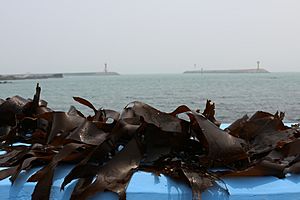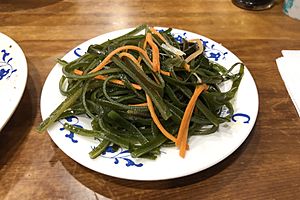Saccharina japonica facts for kids
Quick facts for kids Saccharina japonica |
|
|---|---|
 |
|
| Scientific classification |
|
| Clade: | SAR |
| Phylum: | Ochrophyta |
| Class: | Phaeophyceae |
| Order: | Laminariales |
| Family: | Laminariaceae |
| Genus: | Saccharina |
| Species: |
S. japonica
|
| Binomial name | |
| Saccharina japonica (J.E. Areschoug) C.E. Lane, C. Mayes, Druehl & G.W. Saunders
|
|
| Script error: The function "autoWithCaption" does not exist. | |
| Synonyms | |
|
Laminaria japonica J.E. Areschoug |
|
Script error: No such module "Check for conflicting parameters".
Saccharina japonica is a type of seaweed known as kelp. It grows in the ocean and belongs to a group called brown algae. This special seaweed is grown a lot in the seas near China, Japan, and Korea.
People in East Asia eat Saccharina japonica very often. It's a really important plant for food and other products. In Japanese, it's called ma-konbu (真昆布). Koreans call it dasima (다시마), and in Chinese, it's known as hǎidài (海带).
Farmers grow this kelp using a simple method called rope cultivation. They attach the seaweed to long ropes floating in the ocean. This helps them grow large amounts of Saccharina japonica. Besides being a popular food, this kelp is also used to make a product called alginate. China produces thousands of tons of alginate from this seaweed every year.
Contents
How We Grow Kelp
Growing Saccharina japonica has become very advanced over time. Even though most of Japan's kombu (which is this kelp) comes from Hokkaidō, people now grow it in many other places. You can even find it growing as far south as the Seto Inland Sea. This shows how much farming technology has improved.
Kelp in the Kitchen
Saccharina japonica is a super popular ingredient in many East Asian dishes. It adds a unique flavor and texture to meals.
Kelp in Chinese Food
In Chinese cuisine, thin slices of kelp are often served as a cool starter. It's a common dish to enjoy before the main meal.
Kelp in Korean Food
In Korean cuisine, dasima is used in many different ways.
- It's often used to make tasty broth for soups.
- People deep-fry it to make crispy snacks called bugak or twigak.
- It can be pickled in soy sauce to make jangajji.
- Sometimes, it's eaten raw as a vegetable for ssam (which means wraps).
You can also make a warm drink called dasima-cha (kelp tea) from it.
Cheonsa-chae are special noodles made from the alginic acid found in dasima.
Some popular instant noodle brands in Korea, like Nongshim's Neoguri and Ottogi's Odongtong Myon, even include a big piece of dried dasima in every package. This helps give the noodles a rich, seafood flavor.
Images for kids
-
Raw dasima served as a ssam vegetable, with dipping sauces
-
Dried dasima for broth
-
Dasima-bugak (deep-fried kelp snack)
-
Cheonsa-chae (kelp noodles)
 | Isaac Myers |
 | D. Hamilton Jackson |
 | A. Philip Randolph |






